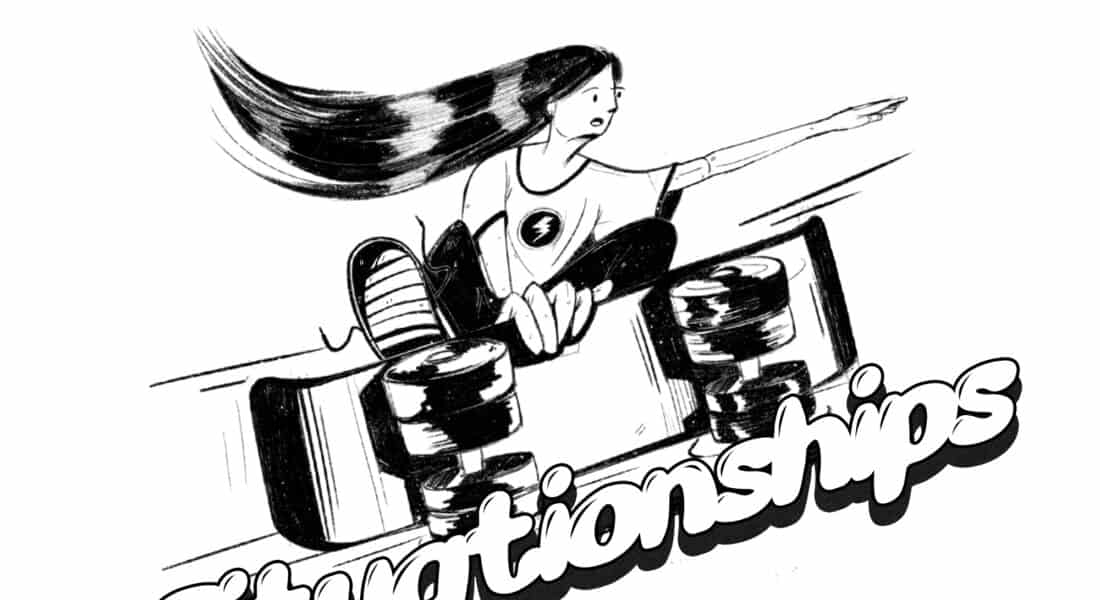
A modern-age, collective romantic experience consists of sweet smirks, trauma bonding, funny feelings, the fear of ghosting, and a good 8754389 ‘maybe, maybe not’ overthinking spirals. And don’t forget the big question, which sneaks up just at the right time: “What are we?”. And suppose your fairly ‘chill’ equation has an organic, emotional connection with great sex and a secret quest for labels and clarity– then may I introduce you to a club I like to call the hush heartbreaks because it’s likely that you’ve found yourself in a… situationship!
For those in denial and my mom, situationships are romantic relational dynamics involving a spectrum of emotional and sexual intimacy, intellectual chemistry and even sexual exclusivity without a relationship’s label, commitment, and structure. Think of it like a rollercoaster ride. Depending on who you are seated next to, the ride can be fun, scary, or weird with a series of loop-de-loops and twists and turns, highlighting the ambiguity of such journeys. As it’s usually hard to tell when the loop-de-loops will come, it can make one clutch the handlebar tighter with anxiety, helplessness, or even excitement and thrill. Either way, it’s likely to make you feel out of control.
Being cautiously curious about my own set of undefined relationships has led me to some exciting revelations. For instance, deterring from conventional dating norms in a situationship could be relieving and self-exploratory. It can allow you to embrace the current nature of your relationship rather than focusing on what it needs to be and where it needs to go, which can be helpful when you are going through a transitional phase in your life, such as a recent breakup, relocation, or time constraints. Situationships are also great if you wish to connect with multiple people, explore your sexuality, or when you’re clear that you’re not looking for commitment at your current stage of life, but still want to date.
But here’s where things get messy in this club. As fun and thrilling as a situationship can be, it can also clash with how culture and regimented scripts have socialized you– we have mainly been taught to value heterosexual, monogamous relationships with rigid commitment frameworks. These cultural scripts provide us with relationship labels that not only give meaning and set expectations but also provide legal and psychological safety to partners. Now, when we sail on our situation- ships (gettit?) made of low structure and high ambiguity- it tends to drag down our socially conditioned anchor, causing friction and jam.
With that, the case in motion seeks: how do we deal with the uncertainty caused by the design and nature of situationships and assess whether it’s working?
Here are some therapist-approved ways:
1) ‘It Had to be YOU’ by Harry Connick Jr. :
In the wise words of my ex… therapist (obviously)– “One of the most profound and bewildering relationships you’ll share is with yourself– let’s start by acknowledging it”. She wasn’t wrong. When you explore your relationship with yourself, you give rise to active self-exploration, and advocacy which means acting on the gained awareness. As a result, our needs and goals from other relational dynamics also start to become clear. A great place to kick off this adventure is by exploring your values– don’t worry, this is not a segue into a moral science lesson. Simply put, values are your heart’s deepest desires for how you want to show up and treat yourself, others, and the world around you.
Think of your values like an inner compass – they’ll help you make choices based on the directions you want your lives to go. But here’s the catch – we create and choose our values; they are not based on what others expect of us or what we’ve learnt about what we should be doing.
Values can be a quiet grounding in the unchartered territories of situationships. When you find yourself in a situationship, values become essential because they enable you to evaluate how you are treating yourself or being treated in the dynamic. You also get a fair sense of what you don’t want and, most importantly, if the current situationship is not aligning with what you desire. This can then translate into more clear communication with your partner about what you need in that dynamic. Values can also guide you to take decisive actions!
2) ‘Vision of Love’ by Mariah Carey:
How do I feel cared for in this dynamic? Stay with me– this is an important one. Irrespective of how serious, casual, or non-committal your relationship seems, you deserve care and respect. You may often confuse the person’s attraction towards you with care, but it may not necessarily be so. Caring can be in the form of having a visible interest in your life and who you are outside of your situationship, practicing honesty, accountability and sensitivity from time to time and holding a space for each other’s emotions without judgment.
Now, if reading this is bringing up that familiar feeling of dread and subsequent wish to hide under a rock of ignorance, bear with me. I know it hurts to come to terms with it but trust me, there is light at the end of this tunnel.
If your situationship has been leading to more distress and instances of self-betrayal, and this seems like a familiar pattern, you may want to look into exploring family-of-origin wounds. The family unit you were raised in has a significant impact on your developmental years and your relational experiences as an adult. Exploring and working on how it plays out in your current situationships can help you make better sense of where you’re at and where you’d like to be. Therapy is a great space to work through some of this!
3) ‘The Way You Make Me Feel’ by Michael Jackson:
Vulnerability is often misunderstood and overlooked in general, but more so in situationships. Vulnerability isn’t only about sharing your insecurities and deep feelings, it can also look like something as small and scary as cracking a joke that you’re not sure is funny, taking the risk of telling someone you like them, wearing something you usually wouldn’t choose to wear or even sharing an opinion that may not sit well with others. Vulnerability will require you to share, reveal parts of yourself and stick your neck out emotionally. Within relationships, irrespective of their nature, this becomes grounds for more profound exploration, clarity, and connection.
While in a situationship, you can ask yourself– “How sure and safe do I feel to convey simple questions, needs, or concerns?” “Do I mostly feel validated or inhibited and fearful?” Your answers can be cueing towards the quality of your situationship. TAKE.THEM.SERIOUSLY.
And with that, the saga of the Hush Heartbreaks Club comes to an end but not without this gentle reminder– Situationships are relationships. This means they can be scary, hard to sail through, and at the same time, wholly meaningful, irrespective of how long they last. Labels are not the only ways to legitimize relationships. So if your situationship doesn’t work out for exhaustingly frustrating reasons, remember that you are allowed to call it and grieve it like a breakup. Acknowledging your situationship for what it meant to you will naturally allow you to process it authentically.
Lastly, it’s okay if you want to change your membership to this club. You can go from being a regular member to experiencing the super exclusive benefits of premium membership or even exploring the mind blowing features of a group membership. The club is yours, you get to decide your membership benefits here. 😉

